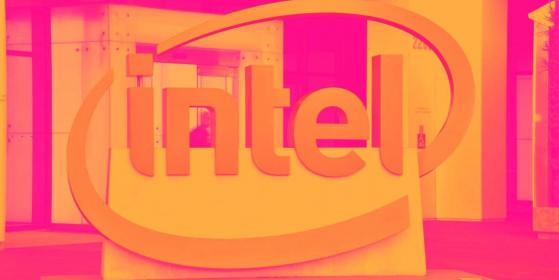What Happened: Shares of computer processor maker Intel (NASDAQ:INTC) fell 12.9% in the afternoon session after the company reported fourth quarter earnings results and provided revenue and non-GAAP EPS guidance below expectations. Intel attributed the weak guidance to "discrete headwinds" that affected some of its business segments, including Mobileye, PSG (Programmable Solutions Group), as well as business exits. However, the company expects the challenges to be temporary and guided for sequential and year-on-year growth in revenue and EPS for each quarter of FY'24.
On the other hand, revenue and EPS exceeded expectations during the quarter. Gross margin also improved, and the inventory level shrunk. Overall, the results could have been better, with the weak outlook likely to raise concerns among investors.
Following the results, the company received a double rating downgrade, suggesting the market needs to be clearer about Intel's AI strategy as Wall Street analysts anticipate new stocks will benefit from the growing AI revolution in 2024.
Needham analyst Quinn Bolton lowered the stock's rating from Buy to Hold, adding, "We expect AI to remain the spending priority in the data center for the next several quarters...To that end, dollars will continue moving away from Intel's core competency." Similarly, Summit Insights Group revised its rating from Buy to Hold, echoing a similar sentiment as it expects "More bumpy rides with AI materially impacting Intel's traditional data center segment."
The stock market overreacts to news, and big price drops can present good opportunities to buy high-quality stocks. Is now the time to buy Intel? Find out by reading the original article on StockStory.
What is the market telling us: Intel's shares are somewhat volatile and over the last year have had 14 moves greater than 5%. But moves this big are very rare even for Intel and that is indicating to us that this news had a significant impact on the market's perception of the business.
The biggest move we wrote about over the last year was 6 months ago, when the stock gained 8.2% on the news that the company reported second quarter earnings that beat analysts' revenue and earnings per share (EPS) expectations. In May 2023 at a bank conference presentation, Intel management remarked that the company's Q2'23 revenue would come in at the high end of guidance. Instead, it exceeded the high end, which is a big positive for a company where there are questions about revenue stability. Management attributed the impressive topline results to the strength of the Foundry business, which grew by a whopping 307% year on year, offsetting some of the declines recorded in other segments.
Additionally, next quarter's revenue and EPS guidance both slightly exceeded Consensus expectations. Inventory levels also improved.
On the other hand, its deteriorating operating margin isn't a great sign but it's comforting that unlike last quarter, the company generated a positive adjusted operating profit.
The company touched on its positioning and capabilities in the growing AI market, adding that "AI is 1 of our 5 superpowers along with pervasive connectivity, ubiquitous compute, cloud to edge infrastructure and sensing, underpinning a $1 trillion semi industry by 2030. Intel Foundry Services, or IFS, positions us to further capitalize on the AI market opportunity as well as the growing need for a secure, diversified and resilient global supply chain."
The bullish commentary is encouraging, given that the Data Center and AI segment was down 15% year on year.
Wall Street analysts also raised concerns about the segment's performance. TD Cowen analyst Matthew Ramsay added that "Headwinds remain in [Data Center and AI group] as cloud share loss, soft enterprise/China and AI spending shifts continue.". This highlighted the growing sentiment that Intel could demonstrate more strength in the AI market, which is up for grabs as tech platforms jostle for dominance and market share.
Overall, the results were positive amid low expectations, and shareholders should feel optimistic.
Intel is down 8.1% since the beginning of the year, and at $43.91 per share it is trading 13.5% below its 52-week high of $50.76 from December 2023. Investors who bought $1,000 worth of Intel's shares 5 years ago would now be looking at an investment worth $940.02.
